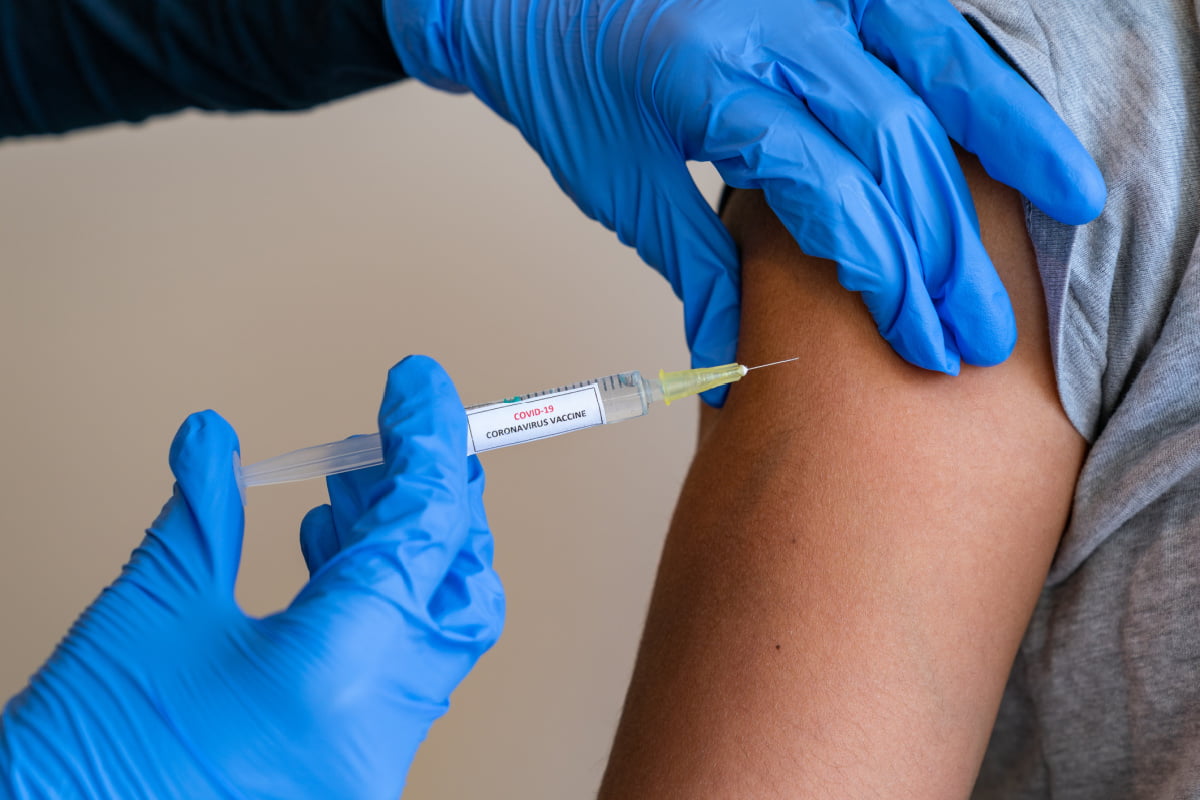Still Hesitant to Get a COVID-19 Vaccine? Dr. Sobel Shares His Vaccine Experience

As a board certified cosmetic surgeon, I see patients who hold a variety of perspectives on vaccination, but I have found that we all have one thing in common: we all hope to return to normal. With the abundance of incomplete or misleading information about the COVID-19 vaccine, it is understandable if you are one of the many Americans still feeling hesitant to sign up for the shot.
I believe that this is our “shot” and that vaccination is a critical part of the path toward a renewed normal. Below, I share my personal experience receiving the COVID-19 vaccine.
Find a vaccine near you in Washington »
My COVID-19 vaccine experience, from Dr. Alex Sobel
My vaccination experience was seamless and easy. Thanks to the King County Medical Society, I was made aware as soon as a slot was open for me, and I scheduled my appointment with the Everett Clinic.
Visiting the Everett Clinic for the vaccine
As taxed as the medical professionals at the Everett Clinic were, trying to get as many shots as possible in patients’ arms, the facility and the communication at the clinic were crystal clear. Their staff explained to me how to prepare for the vaccine (wear a short sleeve shirt), exactly when and where I needed to be to receive my vaccine, and what to expect (it’s important to stay where you are for 15 minutes after vaccination to ensure you will get proper care in the rare case you have an allergic reaction).
When I arrived for my appointment, the staff maintained physical distancing while informing those of us receiving vaccines of the process. We were all moved very efficiently through the facility. I didn’t have someone take a picture of my vaccination experience because, frankly, there were no spare hands. These folks were working hard to make sure as many people as possible could get vaccinated that day. Before my shot, I didn’t even bother sitting down: I rolled up my sleeve and accepted my vaccination.
While I waited around the 15 minutes required to ensure I did not have a reaction to the vaccine, I signed up for the V-safe after-vaccination health checker from the CDC, a text message-based service that allows you to voluntarily provide healthcare statisticians with information about how you’re feeling after vaccination. I encourage you to contribute to this data.
How I experienced side effects after vaccination
After my second Moderna vaccine, I felt tired for about a week. (Side effects range from a mildly sore arm to a fever.) This is nothing to be discouraged by nor afraid of, but rather a sign that your immune system is properly functioning. Know the possible side effects, and plan for them.
Remember that any symptoms you experience from the vaccine will be far less risky and inconvenient than taking your chances when it comes to contracting COVID. Healthcare workers across the country are working so hard to make this a safe, effective, and pleasant experience. Several million shots are delivered in arms every day and now the vaccine of your choice is likely easily available in your area. Please contribute to our collective safety—please get vaccinated.
COVID-19 vaccine quick facts
- COVID-19 vaccines are currently available to everyone age 12 and older in the state of Washington.
- These vaccines are offered at no cost to you at many local pharmacies and other convenient locations.
- We are still short of enough vaccinated Americans to reach population immunity, or herd immunity—the point at which we will have “defeated” the coronavirus.
- Once you are vaccinated, you can safely gather with friends and family.
- Clinical trials for children ages 6 months to 11 years old have begun, and experts are cautiously optimistic that school-age children could receive vaccines as early as this fall.
How to find a COVID-19 vaccine near you
- Vaccine finder for the state of Washington »
- Vaccine finder for the United States »
- Get the latest information from the Washington Department of Health »
Still have questions? Here are 4 ways to learn more about the COVID-19 vaccine & overcome vaccine hesitancy.
1. Get answers from reliable sources.
Find trustworthy information by looking to medical and public health professionals, such as your family doctor, Washington state department of health, and the Centers for Disease Control and Prevention (CDC). The CDC regularly updates its guidelines to give you the latest research-driven information. Visit the CDC’s COVID-19 vaccine hub, with specific pages detailing what you can safely do once you are vaccinated; learn about common side effects and how to deal with them; and read this list of useful answers to frequently asked questions about the vaccine.
2. Learn more about how vaccines work.
Learning about how the mRNA (Pfizer and Moderna) and viral vector (Johnson and Johnson) vaccines are made can help to clarify why and how they work. Also be sure to read about why these common vaccine myths are untrue.
3. Talk to friends and family who have received the vaccine about their experiences.
Learn about how the vaccine affected those you trust and care about, whether they are friends, relatives, or coworkers. Finding out how the people around you reacted to the vaccine can help to ease anxiety around getting the shot.
4. Read about possible side effects, and make arrangements with family and coworkers in case you experience them after your vaccine.
Side effects after vaccination are normal—these are a sign that your immune system is learning how to recognize and fight the virus that causes COVID-19. Side effects from vaccination are typically far more tolerable (and most definitely less dangerous) than experiencing illness from the virus itself.
When you’re ready to schedule your vaccine, talk to coworkers, family, and anyone else who may be affected if you need time away from work or family obligations, and enlist their support.